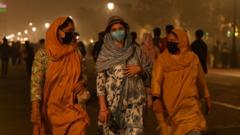A series of investigations in Delhi highlight the detrimental health effects associated with a garbage-to-energy facility. Residents report chronic illnesses and environmental hazards from toxic emissions, stirring public concern and calls for action on urban pollution.
Investigating Delhi's Toxic Challenge: The Energy Plant's Impact on Health

Investigating Delhi's Toxic Challenge: The Energy Plant's Impact on Health
Chronic health issues in New Delhi have been linked to an industrial plant converting garbage into electricity, prompting extensive investigations into air quality and public health risks.
In the bustling streets of New Delhi, a troubling battle is unfolding between the push for sustainable energy and the grim realities of air pollution and public health. Residents near a controversial garbage-to-electricity plant are claiming serious health issues, prompting an urgent investigation into the environmental impact of this facility.
Since 2019, efforts to uncover the potential dangers of this plant have intensified. Journalists and public health advocates have set up monitoring equipment, literally traversing rooftops and residential areas to capture emissions from the facility. They followed trucks laden with ash from the burns, tracing their routes to neighborhoods where the residue is dumped, gathering samples despite the noxious fumes that inflict painful physical symptoms like migraines and respiratory distress.
The repercussions of pollution in New Delhi are being felt acutely. Among the distressed residents is a group reported to be increasingly reliant on nebulizers and other respiratory aids, with medical professionals noting a significant rise in asthma cases and other severe respiratory ailments since the plant began operations. A local doctor pointed out an alarming trend: rising rates of miscarriages in the vicinity, underscoring a possible correlation between environmental toxins and reproductive health.
The stories from Delhi serve as a stark reminder of the complexities involved in transitioning to green energy while safeguarding public health. As the city grapples with its dual challenges of energy production and pollution management, the future of urban sustainability may hinge on addressing such pressing health concerns transparently and effectively. The call for accountability and transparency in the management of industrial emissions is becoming louder, as residents demand adequate solutions to protect both their environment and their health.






















